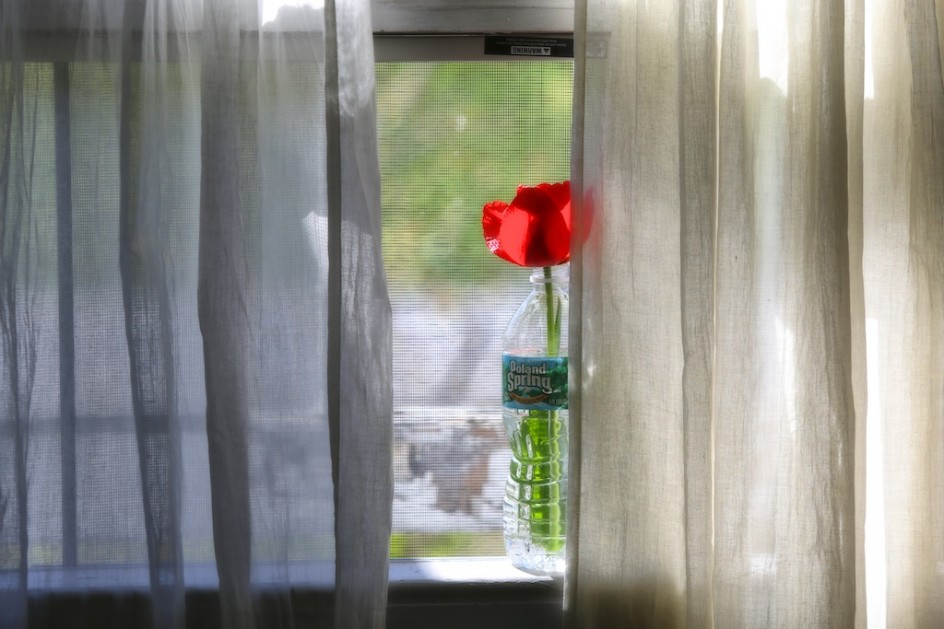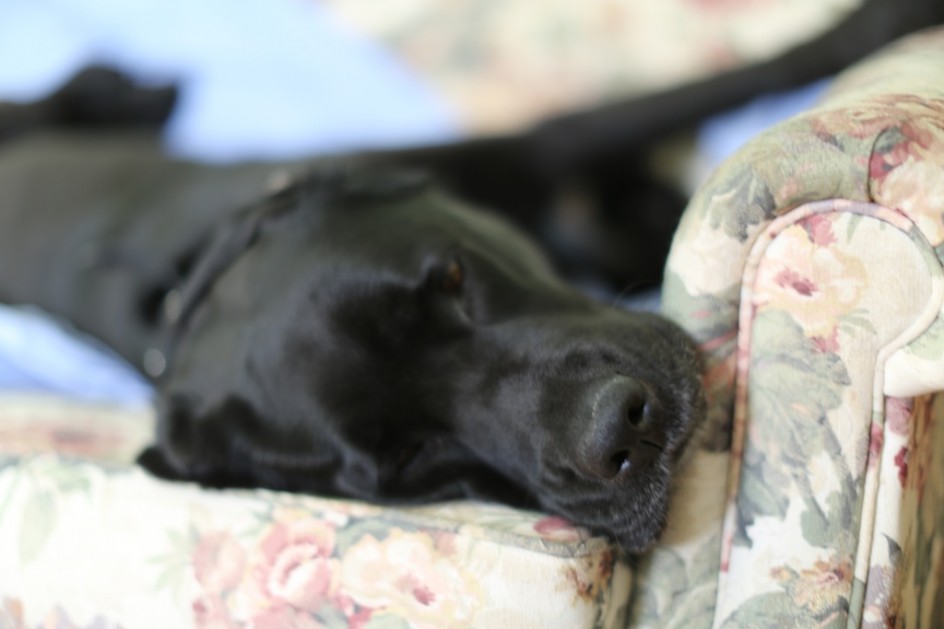
My windowsill gallery, courtesy of my life with an artist, the curator.

Lenore does not need meditation or Tai Chi to relax, she has it down. Rolling in mud is good. Hanging off the edge of your own sofa is good, you simply stretch out, hang your nose off the edge, and snore louder than the trucks passing by outside. Once in this position – good to have your belly up, it catches the cooling breezes from the window, you simply let go, clear your mind and enter a deep and healing state of relaxation. This cures damaged DNA.

Our curious third anniversary was a beautiful day, an important day, a different day than we expected, very different than the quiet old inn in Vermont. It is great to shake up your routines once awhile, I have always believed the first death is the closing of the mind. I soaked up the riches of New York City – my daughter, a great Japanese restaurant, a fun Middle Eastern restaurant, people watching, walking and talking with my wife, and yes, the centerpiece of the trip, the movie on the brilliant and complex moral philosopher Hannah Arendt and her struggles with reason and evil. If you don’t have parents who teach you, you look for teachers wherever you find them, and there have been some important ones there for me – Henry David Thoreau, Thomas Merton, Hannah Arendt. If you keep your mind from freezing, you can learn to the very end, good minds do that, great thinkers do that.
On a personal level, I’ve learned that anniversary’s aren’t about one day, but about a life together. It could be at an inn, holding hands on a train, eating wonderful sushi with King Crab, brushing a donkey in a pasture. It doesn’t really matter, any more than birthdays are a true gauge of the passing of life. On an intellectual level, I took away at lot from this compelling movie, shown at a film forum that could only exist in New York City – the theater was full at 3 p.m. For me, the movie wasn’t about the Holocaust, it was about the life of the mind, learning to think, to make decisions. Hannah Arendt has always been a fiercely original and independent thinker and watching her try and piece together the thinking of a Nazi killer was compelling.
Through all of her many and powerful books, her point has always been the same, even if the Holocaust gave her a rich topic for philosophers. Evil occurs when people lose the power to think, when they attach themselves to labels and ideologies and surrender their own reasoning and decision-making. Eichmann insisted all through his trial – he seemed to believe this – that he had nothing to do with killing, he just organized the bureaucracy, scheduled the trains. He didn’t kill anyone, he kept on saying, it was as far as he could go with it. In her work, Arendt calls upon human beings who seek a meaningful life to think, to make their own decisions, to try and explain and understand the world around them. She was severely, often cruelly criticized for her efforts to explain and understand Adolf Eichmann, the organizer of the extermination of the jews of Europe. To understand evil is not to excuse it, she responded. It is profoundly important to understand our world.
I had a Hannah Arendt moment recently, perhaps wrote a month or so ago when I wrote that I felt some sympathy for the 19-year-old man arrested in the Boston bombings. I told a member of my family that it was sad to think of the victims, sad to think of this young man’s life. She was horrified, angry. He was a monster, a killer, he came to our country and attacked us, betrayed us. How could I defend him? He was no longer human. I tried to tell her that understanding him wasn’t the same as forgiving or excusing him, she could not hear it. I’ve had a lot of Hannah Arendt moments in my life, there is without doubt a loneliness to the hero journey, there are just not a lot of people who choose to make the trip. And if you think a lot about your life, how can you not change it, how can you nor reach behind the suffocating constraints and labels of the world, the “left” and the “right,” the world as an eternal and never ending argument?
Arendt understood that a meaningful life, one in which we learn to make our own decisions, stand in our truth, reject fear as a purpose for living, is not possible unless we learn how to think. Unless we do think. People who kill children and send their families off to death camps are incapable of thought, and that, Arendt said, is the true seed of evil. This is reinforcing to me, reaffirming. Thinking is a lonely business sometimes, one of Arendt’s teachers told her. Yes, it is, and as much we we reach out to others for connection and support, true thinking is something I can only do in my own head by myself. The Internet advances the idea that every thought and feeling must be shared. But learning to think is not a communal event, I don’t believe. Thinking is about making decisions about my life, not swimming in the stream. The rewards are great, but you will pay for it too.
The strengthening of that idea is well worth a trip to New York City. And to be honest, we had fun all day, even talking about the movie.
So it was a good and beautiful day for me. I loved seeing my daughter, we are very easy together, she is very smart, loving and considerate. Spending any time with Maria is a gift. I soaked up the energy of New York, grateful to wander the streets for a bit, grateful to see the city fading through the windows of the train, happy to come back to our farm, our animals. It was great to see an intelligent movie without explosions or special affects, a movie about ideas. This, I said to Maria when we stepped out of the car and listened for the donkey’s braying out in the field, is our life, right here. Yes, she said, it is right here.